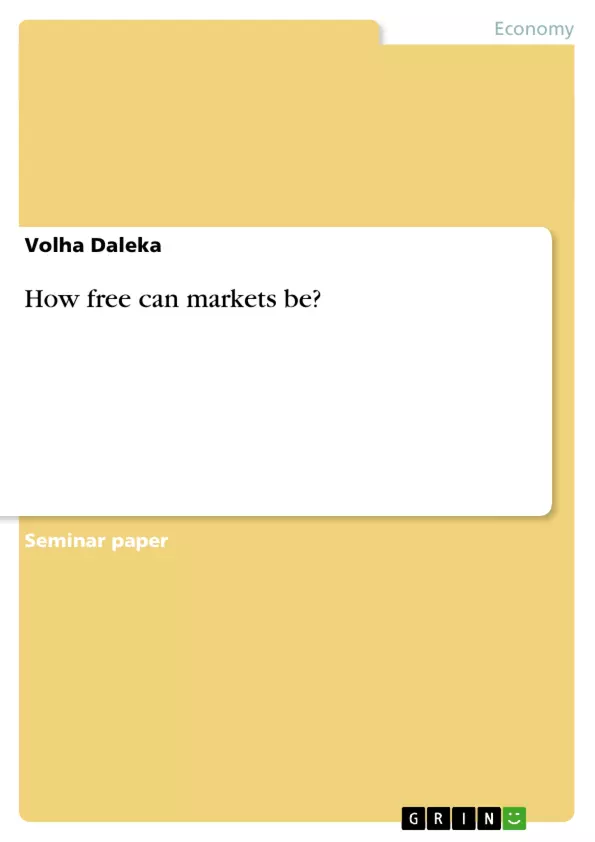Introduction
The present assignment is devoted to the problems of freedom in the markets. We often hear in media, that markets need to be free, especially in our time – time of globalization. There are many international organizations, which were established in order to support freedom of the world market. Statistically, most countries of the world belong to the countries with a free market economy. But are these markets really free? Is it generally possible to find a completely free market? Are there any differences in freedom of the markets, if we compare them in international aspect worldwide? The target of the assignment is to explain, consider, and answer all these questions.
The assignment consists of four parts. In the first part, the definition of a free market will be given. It will be limited, what exactly is to be understood under the term “freedom in a market”, and why do we concentrate on the role of the State in this respect.
The second part of the present assignment answers a question why do markets need rules and referees.
The third part of the assignment is a destabilization of the second part. It also explains what kinds of conflicts and interest splits arise between business community and the State.
In the fourth part of the assignment, the international differences in the degrees of freedom in the markets will be shown as well as the reasons for these differences.
In sum, the major aspects of the issue concerning how markets can be free will be given.
Inhaltsverzeichnis (Table of Contents)
- Discussion of the concepts of freedom in a market
- Why markets need rules and referees
- The interest split of the business community with respect to the role of state
- International differences in the degrees of freedom in the market and reasons behind them
Zielsetzung und Themenschwerpunkte (Objectives and Key Themes)
This assignment examines the concept of freedom in markets, analyzing its definition, the necessity of regulations, and the varying degrees of freedom found internationally. The assignment seeks to answer key questions, including: How free can markets truly be? Are there inherent limitations to market freedom? What factors influence the degree of freedom in different markets globally?
- Defining market freedom and its limitations
- The need for regulations and control in markets
- The conflict between market freedom and state intervention
- International variations in market freedom
- The role of government in regulating and influencing market behavior
Zusammenfassung der Kapitel (Chapter Summaries)
- Discussion of the concepts of freedom in a market: This chapter defines market freedom as a system where prices are set by supply and demand without government intervention. It emphasizes the importance of non-coercion and the absence of government regulation in achieving true market freedom.
- Why markets need rules and referees: This chapter argues that markets need rules and regulations to ensure fair competition and prevent unethical practices. It highlights the potential for market participants to exploit loopholes for profit maximization, leading to social harm if unchecked.
- The interest split of the business community with respect to the role of the State: This chapter discusses the conflicting interests between the business community and the state regarding market freedom. While businesses often prioritize minimal regulation, the state plays a crucial role in maintaining social order and preventing harmful market practices.
Schlüsselwörter (Keywords)
This assignment focuses on the concept of market freedom, analyzing the relationship between market forces, state regulation, and ethical considerations. Key concepts include market freedom, government intervention, social order, unethical practices, international variations in market freedom, and the balance between individual profit maximization and societal well-being.
Frequently Asked Questions
What is the definition of a free market?
A free market is defined as an economic system where prices for goods and services are determined by the open market and consumers, specifically by the laws of supply and demand, without government intervention or regulation.
Why do markets need rules and "referees"?
Rules and regulations are necessary to ensure fair competition, prevent unethical practices, and protect society from harm that can occur when participants exploit loopholes for profit maximization.
Is a completely free market possible in reality?
The assignment considers whether completely free markets truly exist, noting that most international markets operate with varying degrees of state influence and regulatory frameworks.
What is the conflict between the business community and the State?
There is an interest split where businesses often advocate for minimal regulation to maximize profit, while the State must intervene to maintain social order and public welfare.
How do market freedoms differ internationally?
The degree of market freedom varies globally due to different political systems, economic priorities, and the historical role of government in each specific country.
- Quote paper
- Master of Arts (M.A.) Volha Daleka (Author), 2008, How free can markets be?, Munich, GRIN Verlag, https://www.grin.com/document/138712



